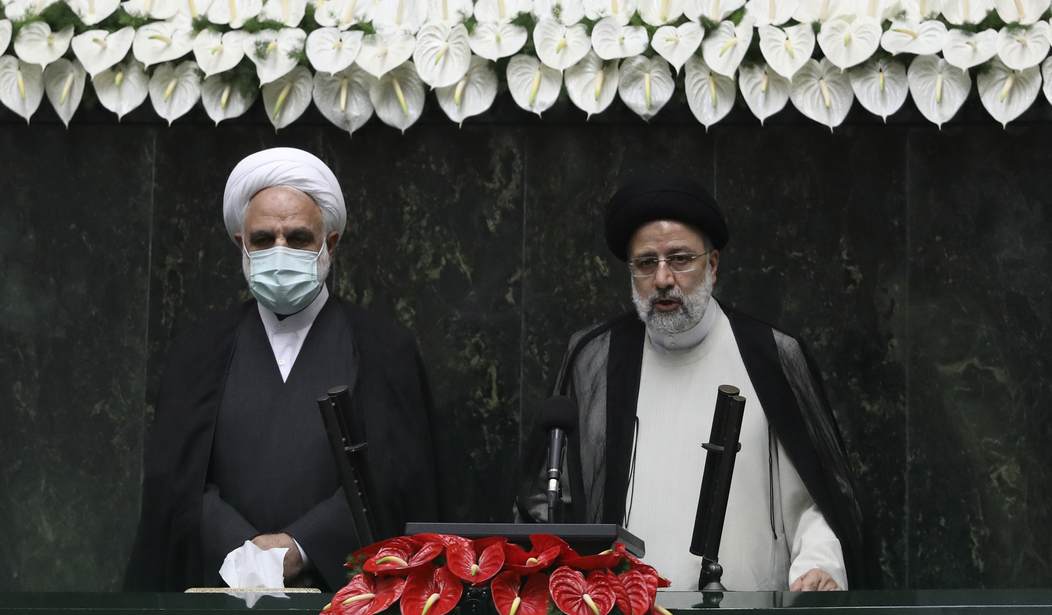Ever since the international community aimed to punish the Iranian regime for its illicit nuclear activities and its support of global terrorism and regional warmongering, Tehran has tried to find ways to sidestep the sanctions regime through money laundering, smuggling and hostage taking.
In March 2021, in his new year’s address and three months before installing Ebrahim Raisi as the new president, the Iranian regime’s Supreme Leader Ali Khamenei gave instructions about how to steer the regime away from being vulnerable to sanctions.
“Our emphatic advice to the officials of our country, whether those who are now in office or those who will come later - is not to tie our economy to the lifting of sanctions. Presume that the sanctions will remain. Plan the country's economy based on the continuation of sanctions,” Khamenei said, abruptly ordering the IRGC to find ways to circumvent sanctions, rather than hoping for the West to lift them.
As oil and gas have historically been the backbone of Iran’s GDP. Instead of going the extra mile to establish an oil-free economy and becoming immune to oil sanctions, the Iranian regime has tried to sell oil through smuggling or shipping it to clients under the flags of other countries. As these operations presented more risk to Tehran’s clients, the regime was forced to offer higher discounts and sell oil at ‘sanctions rates.’
Resorting to propaganda, the regime didn’t hide its cheating and used official and unofficial channels to relay the message it will not bend under Western sanctions.
The Iranian regime’s Minister of Oil, Javad Owji claimed on April 6 that more than $16 billion worth of new oil contracts had been signed since Raisi became president.
The official news agency, IRNA, wrote on April 3: “According to the estimates of oil market consultants and analysts, despite the sanctions, Iran was able to double its exports in 2021 since the beginning of the year.”
Recommended
The very day Russian tanks crossed over international borders and marched through Ukrainian territory, the crisis-driven regime in Iran was quick to believe a golden opportunity is knocking on its doors.
Soaring oil prices and Western reluctance to deal with various international crises simultaneously, sounded like music to Tehran’s ears thinking that it was now the time for maximum extortion. Almost every state official and analyst were conducting interviews or writing op-eds in the media telling the Supreme Leader the opportunity is crying for being exploited.
Although allied in goal, the various regime factions differed in approach. Some believed the regime ought to revive the so-called Joint Comprehensive Plan of Action as soon as possible and at all costs.
"Currently, there is an exceptional opportunity for the Islamic Republic that if the JCPOA is revived, it is an opportunity for a significant export of Iranian oil, for which there is demand now,” former nuclear negotiator and head of the regime’s Atomic Energy Organization Ali Akbar Salehi told the state-run Shafaqna website.
But there were also some people who believed it’s time to push the west for ‘maximum concessions.’
"A major leverage for Russia is the use of energy production capacity," the CEO of the Iran-Russia Friendship Association Amir Mahmoudzadehtold ISNA news agency. “Even now, Europe is almost moving away from the United States over sanctions against Russia because it is in dire need of Russian gas and there is no source for a quick supply of gas in Europe. Accordingly, I think Europe is going to cave to Russia in terms of energy and this threat (sanctions on Russia) is being managed.”
As oil prices approached $130 a barrel, some Western think tanks started to suggest it’s now time to “revise priorities” and use Iranian and Venezuelan oil to reduce dependency on Russian oil. Washington wasn’t decisive over the idea.
In her press briefing on March 4, when asked about “the potential for an Iran deal factor into the supply considerations”, White House Press Secretary Jen Psaki responded: “I would say that the biggest priority with the Iran deal is having visibility into and preventing Iran from acquiring a nuclear weapon. Obviously, as a part of that, if you go back to the implementation of the JCPOA, would be the availability of oil.”
But these hopes turned out to be short-lived. Whether fearing the consequences of the JCPOA revival or emboldened, Moscow threw a wrench in the Vienna talks and asked Washington for its deals with Tehran to be sanction-free. The clerical regime also openly insisted the United States should remove the Revolutionary Guards from the list of Foreign Terrorist Organizations (FTO) which sparked heated debate in the States as well as the region.
On March 30, the Judiciary-run Mizan news agency reported: “Russian Foreign Minister Sergei Lavrov today called on his country to take practical steps with Iran to thwart and neutralize and circumvent Western sanctions.”
“Tehran could teach Moscow how to replicate this illicit financial architecture, or the clerical regime could serve as the Kremlin’s broker, taking a cut of the covert trade it facilitates on Russia’s behalf,” wrote the Wall Street Journal on April 5. “The combination of Russian and Iranian expertise in illicit financial activities could produce the world’s most sophisticated and expansive sanctions-evasion network. If Western sanctions lose their bite, the pressure on Moscow to end its invasion of Ukraine and other threats would diminish.”
The Washington Post also ran an interesting post on April 11, writing: “Rather than moderating the ambitions of authoritarian leaders, their rising wealth — brought about in good part by foreign investment and trade — has emboldened them to challenge Western democracies head-on. So has economic engagement been a catastrophic failure?”
Ever since Washington deemed the 2015 nuclear deal incapable of curbing Tehran’s regional and ballistic missiles ambitions and withdrew from the JCPOA, many sanctions were reimposed and the regime’s illicit activities throughout the Middle East were not immune to the renewed austerity in Tehran. Fiscal inadequacy turned into political shifts in many Middle Eastern countries that the regime considered its “strategic depth”.
The clerical regime advanced its nuclear program and increased hostility towards the US military and its allies in the region. Tehran and its mouthpieces in the West kept claiming that the regime has been successful in circumventing sanctions, i.e., bringing oil sales back to pre-sanctions levels.
No matter the level of truth, Tehran’s various smuggling networks and a clandestine finance system have indeed been a vital lifeline that gave the regime the perception they can take advantage of the current spike in oil prices and ridicule the world’s determination for retribution.
As long as the cheating goes unpunished, the clerical regime believes it can continue to spoon-feed the IRGC and its regional proxies, enough to keep the Iranian people suppressed and its neighbors in dread. If the world is truly about to change the attitude of dictators, it shouldn’t be swinging between energy-dependency from one to the other. Waving sanctions, offering political concessions and security guarantees will only convey the message of remorse and weakness. It’s time to learn from the Iranian and Ukrainian resistance and to stand tall instead of lying low.

























Join the conversation as a VIP Member